The final four is going down this weekend, with Butler, Michigan State, Duke and West Virginia playing. We decided to check which players who shined brighter than anyone else during past final four tournaments, winning the Most Outstanding Player award and later on becoming NBA legends. By the way, from the active players who have won that title, it seems Carmelo Anthony is the only player with a chance to join these guys in the future, and he still has a long way to go before he makes it.
Bill Russell
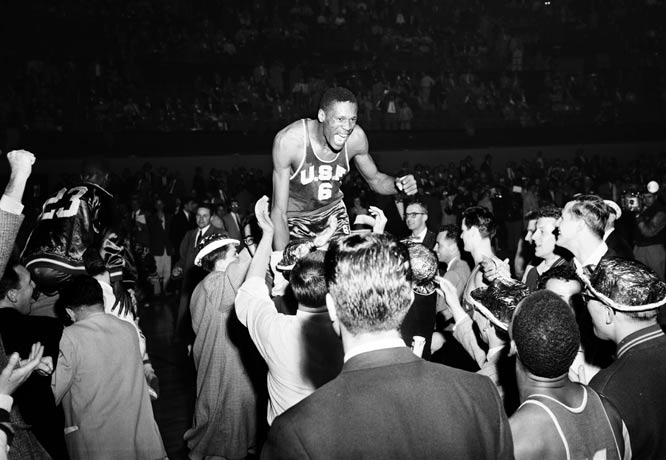
Image: Source
Bill Russell won two NCAA championship with the San Francisco Dons back to back (1955-1956), on a college team that was the first to start three African American players (KC Jones and Hal Perry were the other two). Russell averaged 20.7 points and 20.3 rebounds per game during his college career, winning the MOP in 1955. Russell went on to play for the Boston Celtics and win 11 NBA titles, along with 5 MVP awards. Along with Henri Richard, Russell holds the record for the most championships won by an athlete in one of the big four North American pro-leagues. Russell was inducted into the hall of fame in 1975.
Wilt Chamberlain
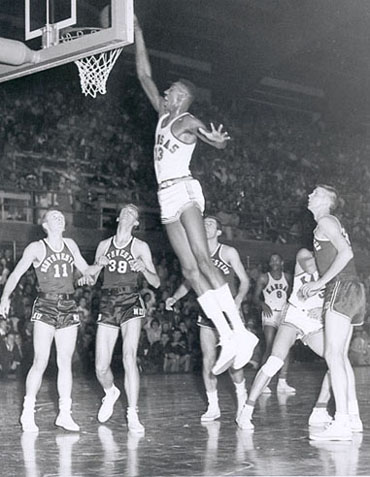
Image: Source
Another NBA icon from the 1960’s and early 70’s, Russell’s nemesis, Wilt Chamberlain. Chamberlain played from the Kansas Jayhawks, not winning the NCAA title with them but did win the MOP in 1957, as Kansas lost in the finals to North Carolina in a triple overtime game that ended 54-53, a loss later described by Chamberlain as the most painful loss in his life. Wilt arrived in the NBA after a year with the Harlem Globetrotters, becoming the most explosive offensive force in the history of the league, winning two NBA titles, four MVP’s and seven scoring titles. Chamberlain finished his career average of 30.1 points and 22.9 rebounds. He was inducted into the hall of fame in 1979 and passed away 20 years later, at the age of 63.
Elgin Baylor
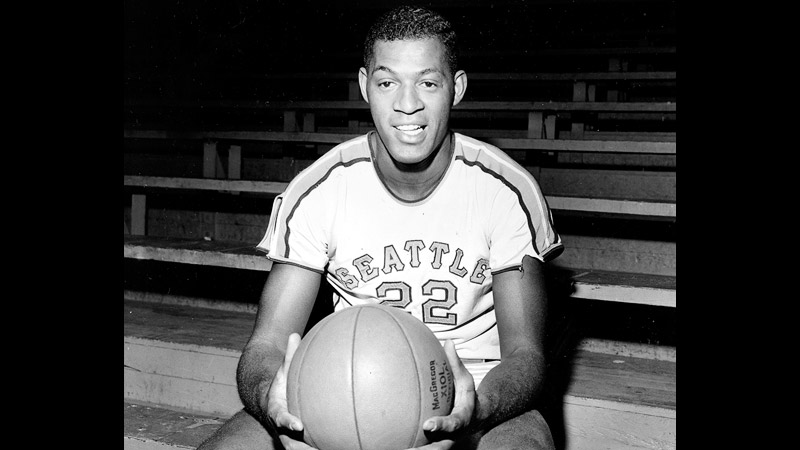
Image: Source
Elgin Baylor led the Seattle Redhawks to it’s last final four appearance in 1958, losing to Kentucky in the final but winning the MOP for his effort. After three years in college, averaging 31.3 points per game, Baylor got drafted by the Minneapolis Lakers, in a move that “saved the franchise”, according to Bob Short. 14 Seasons later, Baylor ended his career without an NBA title, taking the Lakers to the finals eight times, losing them all, in an era almost entirely dominated by the Boston Celtics. The year he retired was the year the Lakers won their first NBA title since moving to LA. Title or not, Baylor is considered to be among the greatest to ever play the game and probably the first true complete all-around player. Baylor finished his career with 27.4 points and 13.5 rebounds per game, making the all-star game eleven times and still holds the record for most points scored in a single game in the NBA finals – 61. Baylor also happens to be one of the most unsuccessful GM’s in NBA history, forming a very unproductive partnership with Donald Sterling.
Jerry West
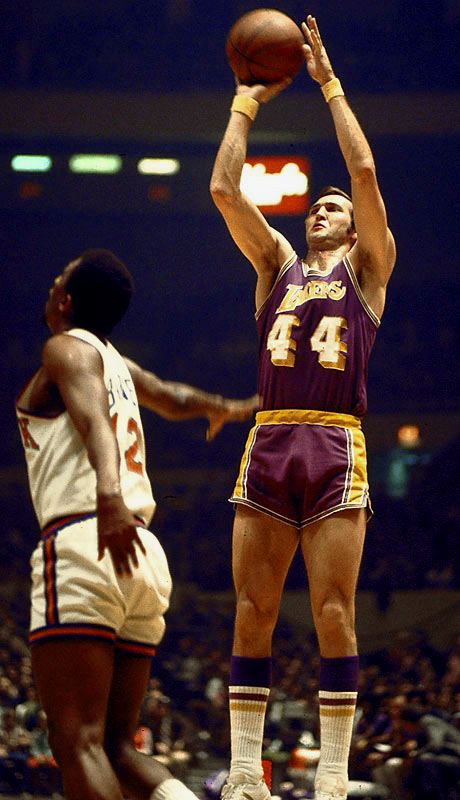
Image: Source
Mr. NBA logo himself, Jerry West played college ball for West Virginia, leading the Mountaineers to it’s only Final Four until this year (my favorites to win it). He led WVU to the final, losing to California 71-70, winning the MOP. He joined Elgin Baylor with the L.A. Lakers, and unlike Baylor, managed to win a title, in 1972. He’s also the only player to win the Finals MVP playing for the losing team (1969, losing to the Boston Celtics, again). West was inducted into the Hall of Fame in 1980, ending his career with a scoring average of 27 points per game and has one NBA scoring title, scoring 31.2 points per game in the 1969-1970 season.
Jerry Lucas
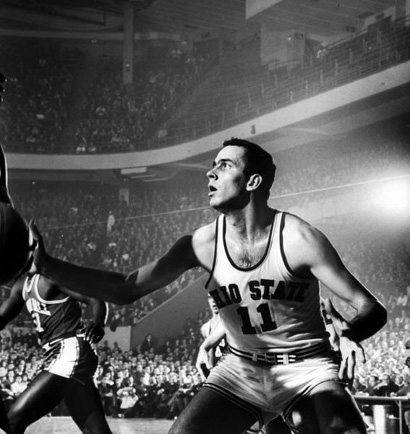
Image: Source
Maybe the greatest player ever in the college level, Jerry Lucas won two consecutive MOP (1960-1961) awards, leading the Ohio State Buckeyes to three consecutive Final Four appearances, winning the championship in 1960. Due to the whole Cleveland Pipers ordeal, Lucas started his NBA career only in 1963, playing for the Cincinnati Royals, San Francisco Warriors and finally the New York Knicks, winning the NBA title in 1973, becoming the first American basketball player to win a championship at every level – high school, college, Olympics and the pros. Lucas was inducted into the hall of fame in 1980, holding career averages of 17 points and 15.6 rebounds per game.
Kareem Abdul-Jabbar
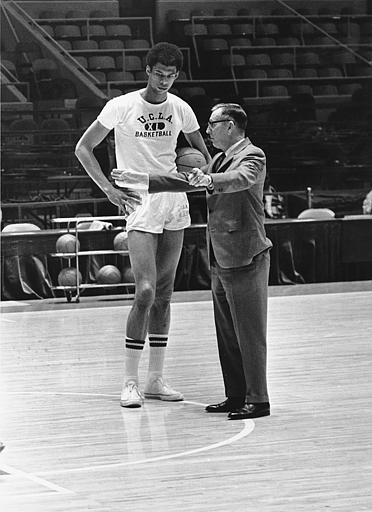
Image: Source
So many records, it’s hard to know where to begin. He won three national championship with the UCLA Bruins under John Wooden, part of the school’s seven consecutive national titles. Jabbar, who was named Lew Alcindor at the time, won the MOP all three times (1967-1969), the only player to win the award three times. He still holds the school record for career point average (26.4), most points in a single game (61) and numerous others. How did he do in the NBA? Six championships, six MVP awards, scoring champions twice and holds the all time records for points scored (38,387), minutes played (57,446) and most all-star selections (19). He was inducted into the hall of fame in 1995, holding career averages of 24.6 points and 11.2 rebounds per game.
Bill Walton
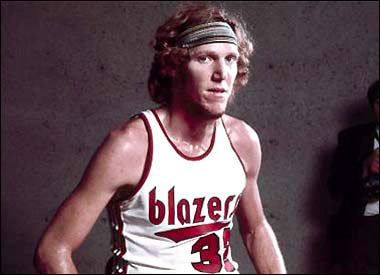
Image: Source
Bill Walton won UCLA’s final three national titles in their seven consecutive run, winning two MOP’s along the way, the last player to win the award more than once.He was part of the school’s 88 consecutive wins streak, including two 30-0 seasons. Walton considers the loss to Notre Dame that ended the streak to be the toughest loss in his life. Walton played in the NBA between 1974-1987 but he missed three complete seasons due to injuries, completing only 468 games in his career. He still managed two NBA titles, one with the Blazers in 1977, the Portland’s only title to date, and one with the Celtics in 1986, coming off the bench, winning the Sixth Man of the Year award. He won the league MVP in 1978, and is the only player in NBA history to win the league MVP, sixth man and Finals MVP during his career.
Magic Johnson
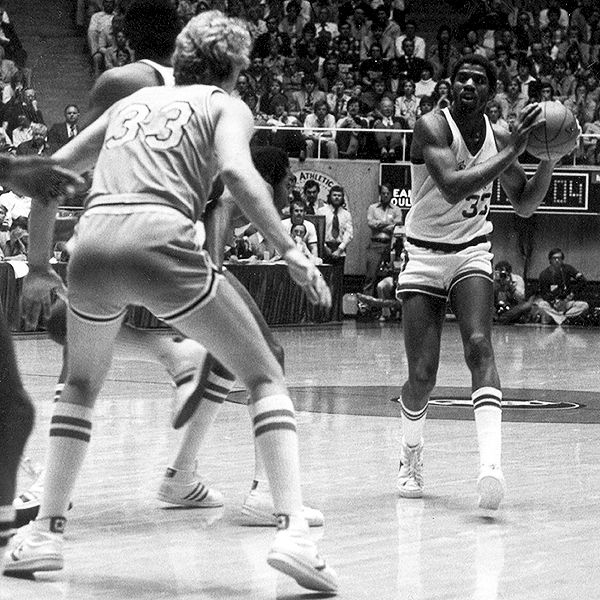
Image: Source
Probably the greatest passer in the history of the game and one of the few who could actually play every position at an all-star level. He led the Michigan State Spartans to the national title in 1979 in the most watched college basketball game at the time – the final against Indiana State, against one, Larry Bird. After two years in college with averages of 17.1 points, 7.6 rebounds and 7.9 assists, Magic went pro and joined the NBA. He won five championships, three MVP awards and three NBA finals MVP. His career assists per game average is the highest all-time (11.2). He also averaged 19.5 points per game and 7.2 rebounds per game. He was inducted into the hall of fame in 2002.
Isiah Thomas
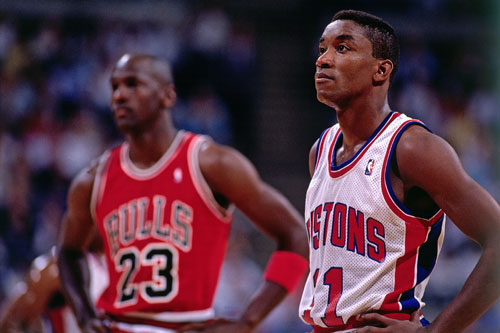
Image: Source
Another great point guard of the 1980’s and one of the most hated men in New York city, Isiah Thomas, like Magic, played two seasons in college, also for a big ten team, Bob Knight’s Indiana. He won the national title with the Hoosiers in 1981, leaving for the NBA after winning the MOP. He played with the Detroit Pistons for 13 seasons, winning two NBA titles, including one Finals MVP (1990). He was inducted into the hall of fame in 2000. His career assists per game average is fifth best all time (9.3) and he also scored 19.2 points per game. He is still the Pistons all time leader in points, assists and steals.
James Worthy
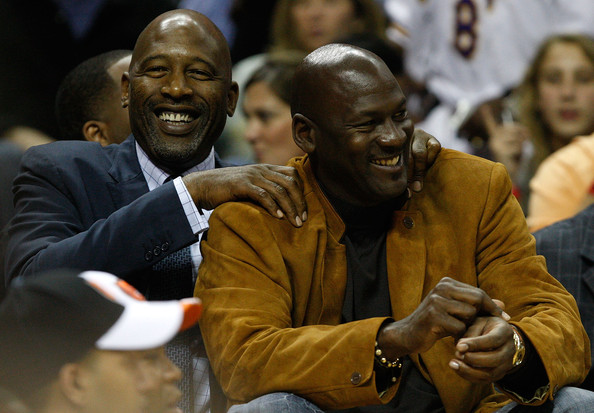
Image: Source
Unlike Thomas, Worthy likes Michael Jordan. James Worthy, “big game James”, was actually the big star on a North Carolina team that had Michael Jordan playing for it as well. Worthy was part of the 1982 national title winning side (with Jordan hitting the winning shot) and won the Final Four MOP before joining Magic, Kareem, and the Lakers. Worthy was part of three championships, winning the Finals MVP in 1988. He was inducted into the hall of fame in 2003 and is one of the greatest Small Forwards in NBA history.
Hakeem Olajuwon
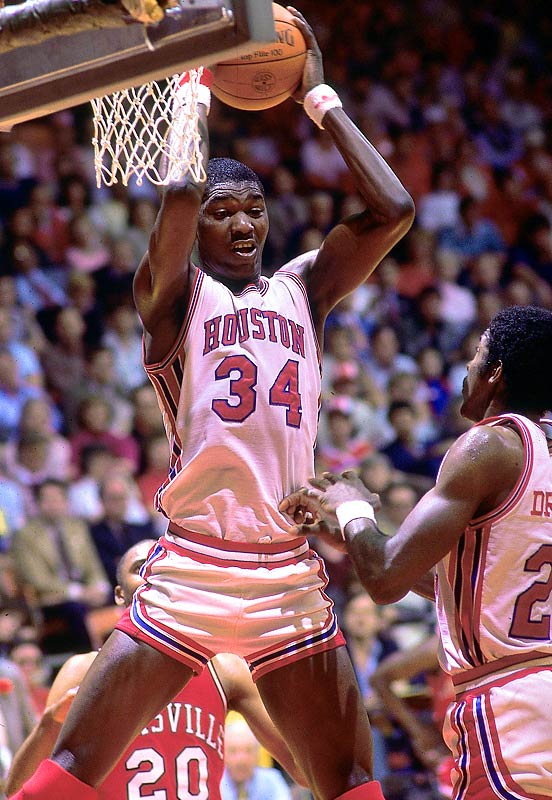
Image: Source
Hakeem is the last player to win the Most Outstanding Player award while playing for the losing side. He starred alongside Clyde Drexler for the “Phi Slama Jama” Houston Cougars team. Olajuwon reached two NCAA finals, once losing to the Wolfpack (1983) and once to the next player on the list and his Hoyas (1984). Olajuwon was part of the 1984 NBA draft, maybe the best draft class ever, joining Ralph Sampson and the Houston Rockets, forming the “twin towers”. It took Olajuwon a decade, but eventually he won two NBA titles with the Rockets, two finals MVP’s and one regular season MVP in 1994. He was inducted into the hall of fame in 2008. He is 10th all time in points, 12th in rebounds, 9th in steals and has more blocks than any other player in NBA history.
Patrick Ewing
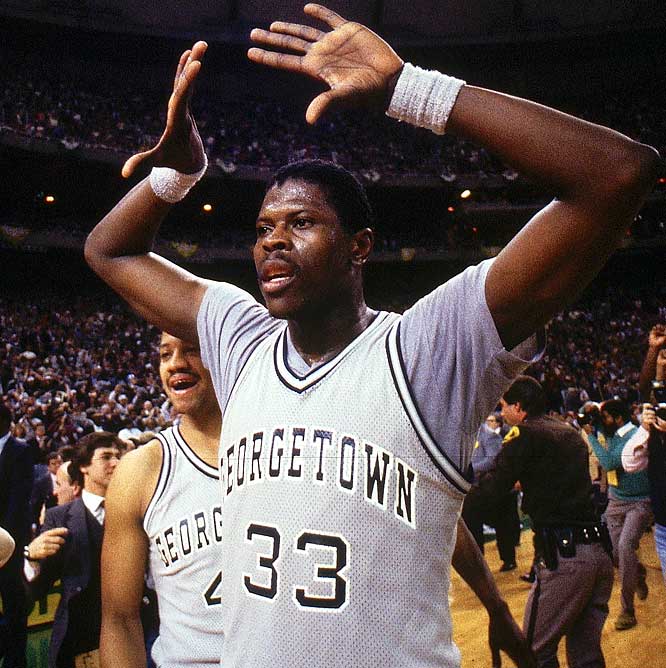
Image: Source
Patrick Ewing reached the national title game three times in college, losing once to Worthy’s and Michael Jordan’s North Carolina, winning it in 1984, beating Olajuwon and Houston and lost again in his senior year, as Georgetown were stunned by the Villanova.
Ewing was supposed to be the savior of the New York Knicks, but never got the city it’s long awaited title, making the finals in 1994 and in 1999. Ewing was part of the 2008 hall of fame class and finished with career averages of 21 points and 9.8 rebounds. He also won two Olympic gold medals in 1984 and 1992.
12 responses to “12 Final Four Most Outstanding Players Who Became NBA Greats”
[…] 12 Final Four Most Outstanding Players Who Became NBA Greats (Sportige) […]
Social comments and analytics for this post…
This post was mentioned on Twitter by xbasketball: “12 Final Four Most Outstanding Players Who Became NBA Greats …” http://bit.ly/dacZwn…
[…] 12 Final Four Most Outstanding Players Who Became NBA Greats … […]
[…] 12 Final Four Most Outstanding Players Who Became NBA Greats … […]
[…] 12 Final Four Most Outstanding Players Who Became NBA Greats … […]
[…] 12 Final Four Most Outstanding Players Who Became NBA Greats | Sportige […]
[…] 12 Final Four Most Outstanding Players Who Became NBA Greats | Sportige […]
[…] jerry west 12 Final Four Most sportige.com […]
[…] Isiah Thomas sportige.com […]
[…] But the future doesn’t necessarily mean a great NBA career for Davis, who averaged 14.2 point, 10.7 rebounds and 4.7 blocks during his freshman year with Kentucky. Surveying the careers of the last 10 MOP winners, chances are against Davis, despite being a rare talent, becoming a huge success in the NBA. […]
[…] But the future doesn’t necessarily mean a great NBA career for Davis, who averaged 14.2 point, 10.7 rebounds and 4.7 blocks during his freshman year with Kentucky. Surveying the careers of the last 10 MOP winners, chances are against Davis, despite being a rare talent, becoming a huge success in the NBA. […]
[…] (photo via Sportige) […]